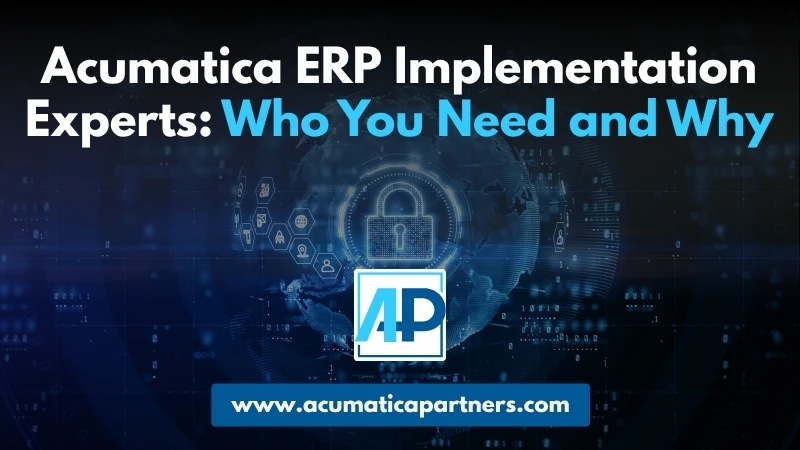Why Acumatica ERP Implementation Experts Make (or Break) Your Project
Ever been halfway through a software project and thought, "Wait... what did we just buy?"
You’re not alone. Implementing an ERP like Acumatica seems straightforward at first—until reality kicks in. There's configuration, user training, integrations, surprise costs, internal resistance... the list goes on. And unless you're in the business of ERP rollouts, it gets overwhelming. Fast.
That’s where Acumatica ERP implementation experts come in. But not just any consultants—the good ones. The kind who actually ask how your teams work, not just what modules you want.
Let’s unpack what real implementation experts do, why they matter more than the software itself (seriously), and how to avoid ending up with a shiny new ERP no one uses.
What Do Acumatica ERP Implementation Experts Actually Do?
Sure, they handle the technical side. But the real magic happens in how they guide you through the chaos:
- Process Mapping: They don't just install the software—they learn how you operate. Then they configure Acumatica to match.
- Data Migration: Moving years of janky Excel sheets and legacy system exports? Yeah, that’s part of the gig.
- User Training: If your warehouse manager or finance lead can't use it, it doesn't work.
- Custom Development: Out-of-the-box rarely fits 100%. Experts fill the gaps without bloating your system.
- Post-Go-Live Support: When things break (and they will), they’re there. Or at least, they should be.
It’s less "install and leave" and more like onboarding a co-pilot who knows the turbulence ahead.
Why DIY or General IT Teams Usually Struggle
Here’s a tough pill: internal IT folks are rarely equipped for full-scale ERP deployments. It’s not a knock—it’s just a different muscle.
ERP implementation requires:
- Deep knowledge of business operations, not just tech.
- Experience managing change across departments.
- Familiarity with the Acumatica platform’s quirks.
And let’s be real: learning Acumatica while deploying Acumatica? That’s like building a plane while flying it. No thanks.
What Makes a Great Acumatica ERP Expert (Not Just Any Consultant)
Okay, so how do you separate the pros from the "we’ve done a few installs" crowd? Look for these traits:
1. They Challenge Your Assumptions
Good consultants aren’t order-takers. If they push back on how you handle inventory or ask, "Why do you do it that way?"—that’s gold.
2. They Talk Business, Not Just Tech
If they can't explain features in plain English or tie configuration choices to real outcomes (like reduced cycle times or fewer errors), move on.
3. They’ve Seen Your Industry Before
Retail vs. distribution vs. manufacturing? Totally different beasts. The best ERP experts bring domain knowledge to the table.
4. They Prioritize People, Not Just Go-Live Dates
A rushed implementation that ignores staff readiness is just a fast path to expensive shelfware.
The Cost of Skipping the Experts (Spoiler: It’s Not Just Money)
Plenty of companies try to save a buck by handling implementation internally or hiring the cheapest firm. What usually happens?
- Over-customization that breaks during upgrades
- Data that doesn’t match across systems
- Frustrated users who revert to Excel
- A general sense of, "This was supposed to make life easier?"
We’ve seen it. Honestly, we’ve lived it.
What a Proper Acumatica Implementation Timeline Looks Like
This will vary, but here’s a loose breakdown:
- Discovery & Requirements (2–4 weeks)
- Process Design & Gap Analysis (3–6 weeks)
- Configuration & Customization (6–12 weeks)
- Data Migration & Testing (4–6 weeks)
- Training & UAT (3–4 weeks)
- **Go-Live & Post Support (Ongoing)
That’s 4–6 months if done right. Anyone promising 30 days is selling you a half-baked rollout.
How to Vet Acumatica Implementation Experts
You don’t need a lie detector, just a solid process:
- Ask for Case Studies: Real ones. With problems and outcomes.
- Talk to References: Preferably ones who are 6+ months post-go-live.
- Check Certifications: Acumatica MVPs or Certified Developers aren’t just fluff—they’ve passed real tests.
- Do a Paid Discovery Project: A short engagement to test how they work with your team.
FAQs About Acumatica ERP Implementation
Is Acumatica easy to implement?
Not exactly. It’s user-friendly once set up, but the implementation itself is complex without the right guidance.
How much does an Acumatica implementation expert cost?
It varies—freelancers might charge $100–$200/hour. Firms often bundle into project fees ranging from $25K to $150K+ depending on scope.
Can my internal team do the implementation?
In theory, yes. In practice, rarely well. Most success stories involve seasoned ERP consultants.
Final Thought: The Software Is Only Half the Story
Here’s the truth: even the best ERP system is only as good as its implementation. Acumatica is flexible, powerful, and genuinely solid—but in the wrong hands, it’s a headache factory.
Find the right expert, and you’ll get more than working software. You’ll get smoother processes, happier teams, and fewer "Why isn't this working?!" Slack messages.
If you’re shopping for Acumatica help, don’t just ask who knows the software. Ask who understands you.

